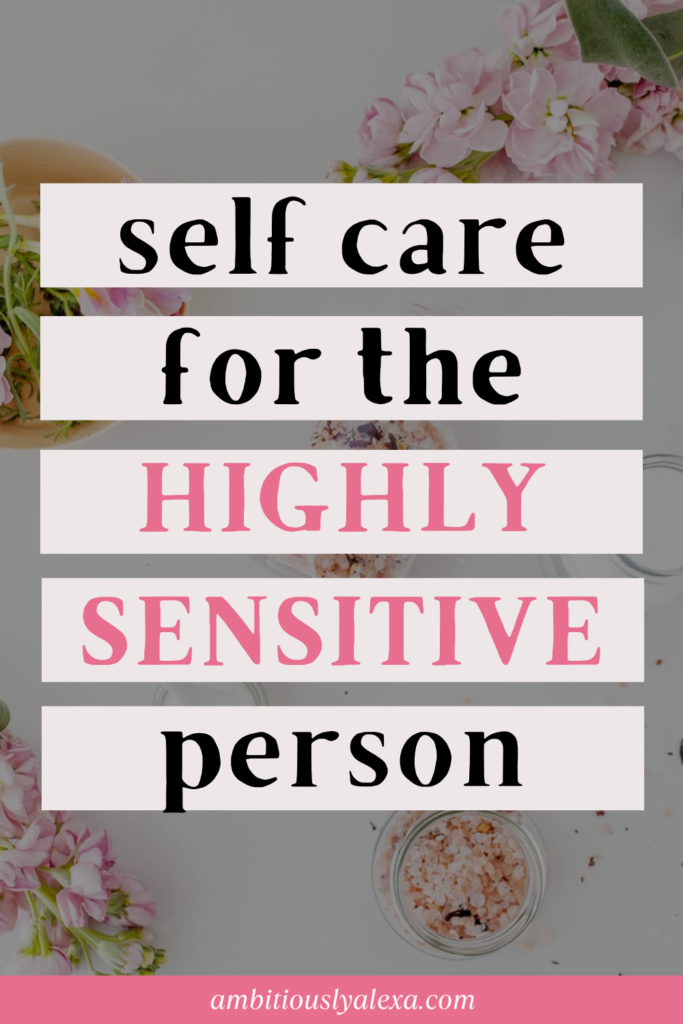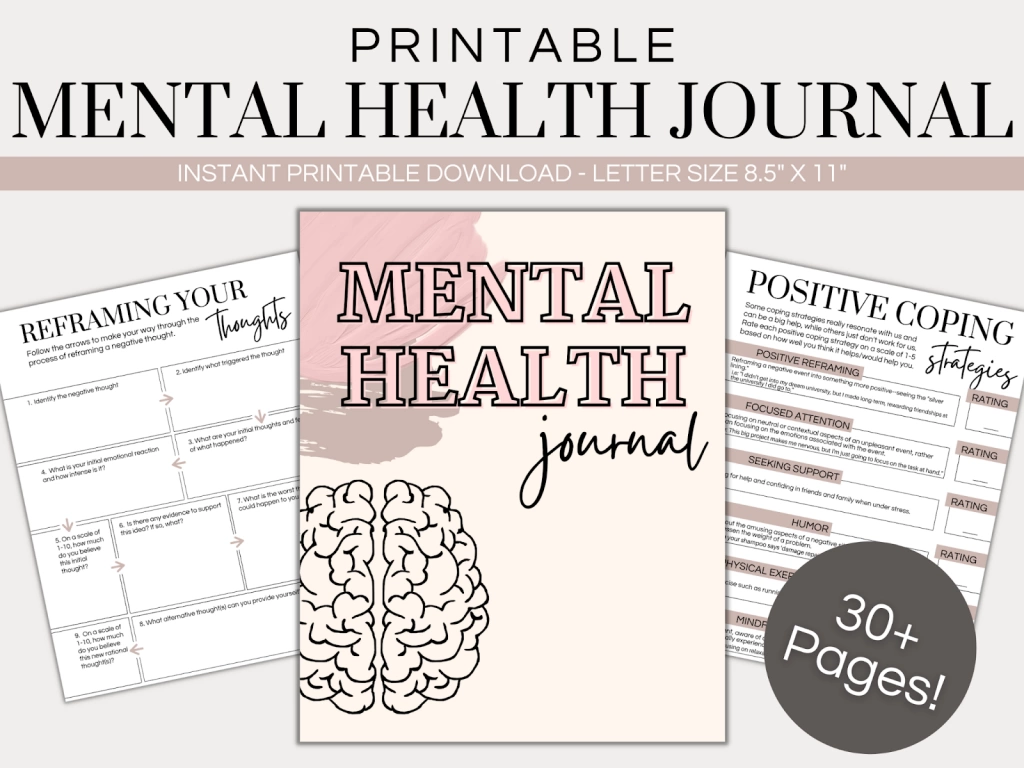Self Care for the Highly Sensitive Person: 20 Practices
This post contains affiliate links and I may receive a small commission (at no extra cost to you) if you sign up or purchase products or services mentioned. Read the full disclosure here.
Last Updated on October 17, 2023
Struggle with getting through the “normal” daily tasks that everyone else seems to get with ease? Feel like your “limit” for overwhelm is lower than others? If it frequently feels like too much, you may be a highly sensitive person!
These ideas for self care for the highly sensitive person (HSP) might be exactly the type of self care you need. Navigating the daily grind of life can be extremely draining for those who are highly sensitive. It’s important to give yourself a little extra self care than others may need.
Daily life can be more manageable with the right self care toolbox in places. Browse through these activities for mental, social, emotional, physical, and spiritual self care to find what’s best for you!
What do highly sensitive people struggle with?
Because highly sensitive people process things very deeply, feeling overwhelmed is a common experience. This means the need for self care is even greater than average! HSPs can face many different challenges that make navigating daily life difficult.
Some of the biggest obstacles highly sensitive people struggle with include feeling:
- Easily overwhelmed with hectic schedules
- Responsible for the feelings of those around you
- Great distress with conflicts
- Prone to social comparison
- Difficulty tolerating “minor” annoyances
- More self-doubt and inner criticism
I know I can relate to just about every one of those 🙋♀️ and unfortunately, HSPs are misunderstood even though they are dealing with very real, troubling challenges. But remember, your wellbeing is a priority and you deserve to protect it!
How do you replete your energy if you’re a highly sensitive person?
So, through self care for the highly sensitive person, there are ways to replete your energy when it’s been sapped!
Here are a few quick ideas to keep in mind for your reference in times of stress.
- Distance yourself from the source of stimulation – it’s best to distance yourself and see if you feel relief. This can be tricky because we’re often afraid of offending others, but don’t jeopardize your wellbeing for the sake of others.
- Practice meditating – this doesn’t need to be intimidating! Simply drawing your attention to your breath, closing your eyes, and grounding yourself in the present moment is enough to make an impact.
- Set the right boundaries for you – saying “no” is one of the biggest obstacles for HSPs to overcome, but the sooner you get comfortable doing so, the better.
- Prioritize weekly self care activities – it’s very important that no matter how chaotic things can get, you’ll want to always prioritize your self care. Be sure to have at least one go-to activity that helps you recharge each week.
You’ve probably noticed that you require more frequent energy repletion than others, and that’s totally okay! Everyone’s needs are different, so try not to compare your needs to others’.
Self-Care Ideas for Highly Sensitive People
If you’re a highly sensitive person in need of some good self care practices, look no further! These practices include emotional self care, mental self care, social self care, physical self care, and spiritual self care for highly sensitive persons.
Mental Self Care
1. Allow yourself to process at your own pace
Have you ever felt pressured to respond or react quicker than you’re able to? You’re not alone. But it’s okay if it takes you more time to fully process, understand, and respond to something.
Give yourself the time and space to process things as you’re able. Phrases like “let me get back to you on that” and “give me a minute to think that over” are lifesavers.
2. Get in touch with your creative side
Having a creative outlet to express yourself can help you decompress from all the stressors you face. Exploring your passions or favorite hobbies (hobby ideas here!) is important for your mental health. These activities can give your life joy and meaning outside of your work life. Making time for hobbies really helps sensitive people thrive!
3. Step away from social media
Easier said than done, right? I know I’m always catching myself in the middle of a scroll when I could be doing something that would actually make me feel good.
But even reducing the time you spend on social media can really help your mental health. It can make the social comparison trap less rampant when you don’t feel inferior to every perfectly curated post you see!
4. Schedule that therapy appointment
One of the most crucial self care activities you can do as a highly sensitive person is therapy! Therapy can certainly be a more “uncomfortable” task, but the benefits are so impactful.
Doing weekly therapy has helped me tremendously with my anxiety, and I always recommend Online Therapy because it’s a comprehensive, effective online therapy toolkit at an affordable monthly cost. Get 20% off your first month at the link below!
Social Self Care
5. Foster close interpersonal relationships
Many highly sensitive people report doing better in 1:1 friendships than in big group settings. This makes sense given your need to connect deeply with others and have meaningful relationships. Keeping your circle small will likely work in your favor, so make sure to make and maintain close friends you can turn to for anything!
6. Make friends with other highly sensitive people
Common ground is always important in friendships, and having someone who can understand your unique perspective is invaluable. Surround yourself with others who can empathize with you to combat those feelings of being misunderstood!
RELATED: Self Care for Introverts: 16 Ways to Recharge Your Social Batteries
7. Navigate away from toxic people
Many HSPs can relate to being people-pleasers. As a result, you’re probably familiar with sticking around toxic people even when you know you shouldn’t. It can be hard to cut people off, especially when you’ve known them for a while. But evaluating your friend circle every once in a while and taking action to cut off negative people is well-worth it.
8. Do something comfy with friends or family
Having a cozy night-in, watching movies in your pajamas, and eating yummy snacks are all feel-good activities to connect with others in a comfortable way! Social anxiety can sometimes get in the way of, well, socializing. Making the socialization experience as comfy as possible makes it more enjoyable!
Emotional Self Care
9. Hug an animal
People work too, but hugging an animal is a quiet and comforting activity without you needing to extend much in return. Whether it’s your dog, cat, hamster, or bunny rabbit, animal cuddles are the best! I have two guinea pigs that I always love to cuddle when I’m having a bad day.
10. Listen to music you love
Music can bring on all sorts of emotions. When you’re feeling overwhelmed, it can help to listen to calming instrumentals or softer songs. Dimming the lights, closing my eyes, and finding a playlist for relaxing spa music is definitely my go-to when I’m stressed!
11. Let yourself feel your feelings
If you always feel like you’re “masking” your feelings based on what society expects of you, that gets draining! But keeping those feelings bottled up can do more harm than good. Make sure you’re making time (ideally when you’re alone and won’t have to face the judgment of others) to express and address your strong feelings.
RELATED: 40 Journal Prompts to Help You Process Your Emotions
12. Use a guided journal
I love guided journals because they take the guesswork out of what to write about! There’s so many guided journals out there for anything you’re working on, whether it be a journal for practicing more gratitude, or a journal for your mental health.
My printable mental health journal is especially useful for making sense of your complex emotions, reframing your negative thoughts, and overcoming unhelpful behaviors. Jam-packed with 33 pages of journal prompts and mental exercises, it’s got everything a highly sensitive person needs to process their emotions!
Physical Self Care
13. Take time to recharge
This is probably a more obvious one, but taking time to physically recharge is a must. This could mean getting extra sleep during the week of a big event in your life, or taking more frequent breaks during stressful work days. Even better is to schedule alone time as needed!
14. Create positive sensory experiences for yourself
In a world of hustle, bustle, and overstimulation, you’ve got to combat that by creating enjoyable sensory experiences to balance it out. You can’t control the unpleasant sensations the outside world brings, but you can take steps to make things more pleasant for yourself.
For example, I like to pay as much attention as possible to what I can do to make myself more physically comfortable in any situation. Is my room too cold? I’ll put on fuzzy socks, a cozy sweater, and make a cup of hot tea. Doing what you can to alleviate discomfort helps so much!
RELATED: 25 DIY Self Care Kit Ideas That Are Simple & Soothing
15. Immerse yourself in nature
A quiet walk in nature may be just the thing you need to charge your batteries and clear your mind. Experiencing the peace of nature is a great way to escape from the busy grind of your routine. Pay special attention to the sights, sounds, smells, and feelings of the great outdoors.
16. Incorporate slow and/or enjoyable physical activity
If high intensity interval training or running is simply too much for you, don’t force yourself to do them! Movement is worth it and can certainly make you feel good both physically and mentally, but only when it’s tailored to your needs.
Instead of over-exerting yourself, opt for lighter activities like yoga, stretching, walking, and bodyweight exercises for strength building.
Spiritual Self Care
17. Listen to your intuition
Many HSPs tend to experience anxiety, which can make it harder to determine if your intuition is overreacting or trying to protect you. If it’s difficult for you to trust your intuition, reflect back on times where you listened to it and it was right! Recording the moments where your intuition helped you can remind you that your “gut instinct” is valid.
RELATED: 40 Spiritual Journal Prompts for Spiritual Growth
18. Read books that inspire you
You’d be surprised by how well a good book can change your outlook on life. You can find books that specifically help you get more in touch with your spiritual side, or any book that helps you turn inward and connect with yourself on a deeper level. The book Rooted: Life at the Crossroads of Science, Nature, and Spirit is a good place to start!
19. Give yoga a try
Even if you don’t think yoga is your thing, it doesn’t hurt to try and see what you experience! The intention behind yoga is to harmonize your body, mind, and spirit. Yoga actually has more than just physical benefits–it can help you achieve non-judgment and acceptance about where you’re at in your life.
20. Create silence
Silence isn’t just about not talking. It’s a state of mind where the focus is on tranquility, quiet, and stillness. It gives you the chance to turn inward instead of feeling distracted and overstimulated by the bajillion things you’re doing each day! Life can get so go-go-go. Take time to rest and bask in the peace and quiet of your surroundings when possible.
More Self Care Ideas You’ll Love
Self Care for Introverts: 16 Ways to Recharge Your Social Batteries
25 DIY Self Care Kit Ideas That Are Simple & Soothing
40 Journal Prompts to Help You Process Your Emotions
50 Influential Journal Prompts to Heal Your Inner Child
LIKE THESE SELF CARE FOR THE HIGHLY SENSITIVE PERSON IDEAS? PIN THEM FOR LATER!










